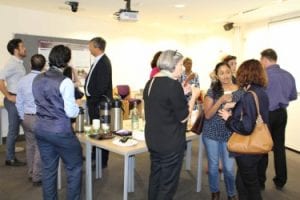UCL in the Middle East: crossing cultures
By ucyow3c, on 21 September 2016
![]() Written by Sophie Vinter, Global Engagement Communications Officer
Written by Sophie Vinter, Global Engagement Communications Officer
“When we talk about the Middle East we’re talking about many places and very different contexts – what goes for Qatar is not the same as for a refugee camp in Syria.”
The panel of the inaugural ‘UCL in the Middle East’ event nodded in agreement at the words of Dr Seth Anziska (UCL Hebrew and Jewish Studies), who was joining in a lively discussion by Skype from the USA.

Jonathan Dale (right) talks with attendees at UCL in the Middle East
Focusing on a range of contemporary issues – ranging from urban development and cultural heritage to healthcare and education – ‘UCL in the Middle East’ was the second regional-specific event that had been organised by Professor Ijeoma Uchegbu, Pro-Vice-Provost (Africa & the Middle East) and the Global Engagement Office. The first event, Knowledge Africa, took place in June.
Open to academics and professional services staff from around the university, these events have offered the opportunity to hear from a range of speakers, network and take part in panel discussions to share ideas and learn more about UCL’s collaborations in a specific area of the world.
Questions from the audience encouraged thought-provoking debate on some hot topics in the Middle East, including the balance of encouraging entrepreneurship while also allowing for intellectual property ownership and the idea of post-conflict ‘interventionism’.

Professor Ijeoma Uchegbu introduces the panel
Professor Deborah Gill, who recently won the Provost’s Spirit of Enterprise Award, showcased how UCL Medical School set up an education consultancy from scratch to help drive up healthcare education – an innovative approach to co-developing solutions to global challenges.
Fatemeh Farnaz Arefian from UCL’s Institute for Risk and Disaster Reduction shared her insights into urban change in Iran and Jonathan Dale (UCL Institute of Education) revealed how the London Centre for Leadership in Learning was helping improve student outcomes through high-quality, effective, school leadership.
Dr Anziska presented on archival research reaching across national borders, while the UCL Institute of Archaeology’s Professor David Wengrow and Dr Beverley Butler discussed successful museums and heritage collaborations.

Academics and professional services staff network
Carlos Huggins presented a summary of UCL Consultants’ activity in the area and the support that they can offer to academics wishing to develop their international collaborations.
Finally, Dr Sam Evans, Operations Director for UCL Qatar, gave a fascinating insight into social challenges in the Middle East and efforts to diversify the economy and modernise the workforce.
Towards the end of the event, discussions turned to universities’ important role as natural mediators and Dr Evans spoke of UCL’s “moral centre of gravity that crosses cultures and contributes to its reputation of academic excellence”.
All agreed that UCL’s interdisciplinarity and respectful way of working with partners can help to build successfully the trust needed to bridge cultural differences and really make a difference on the ground.
 Close
Close

